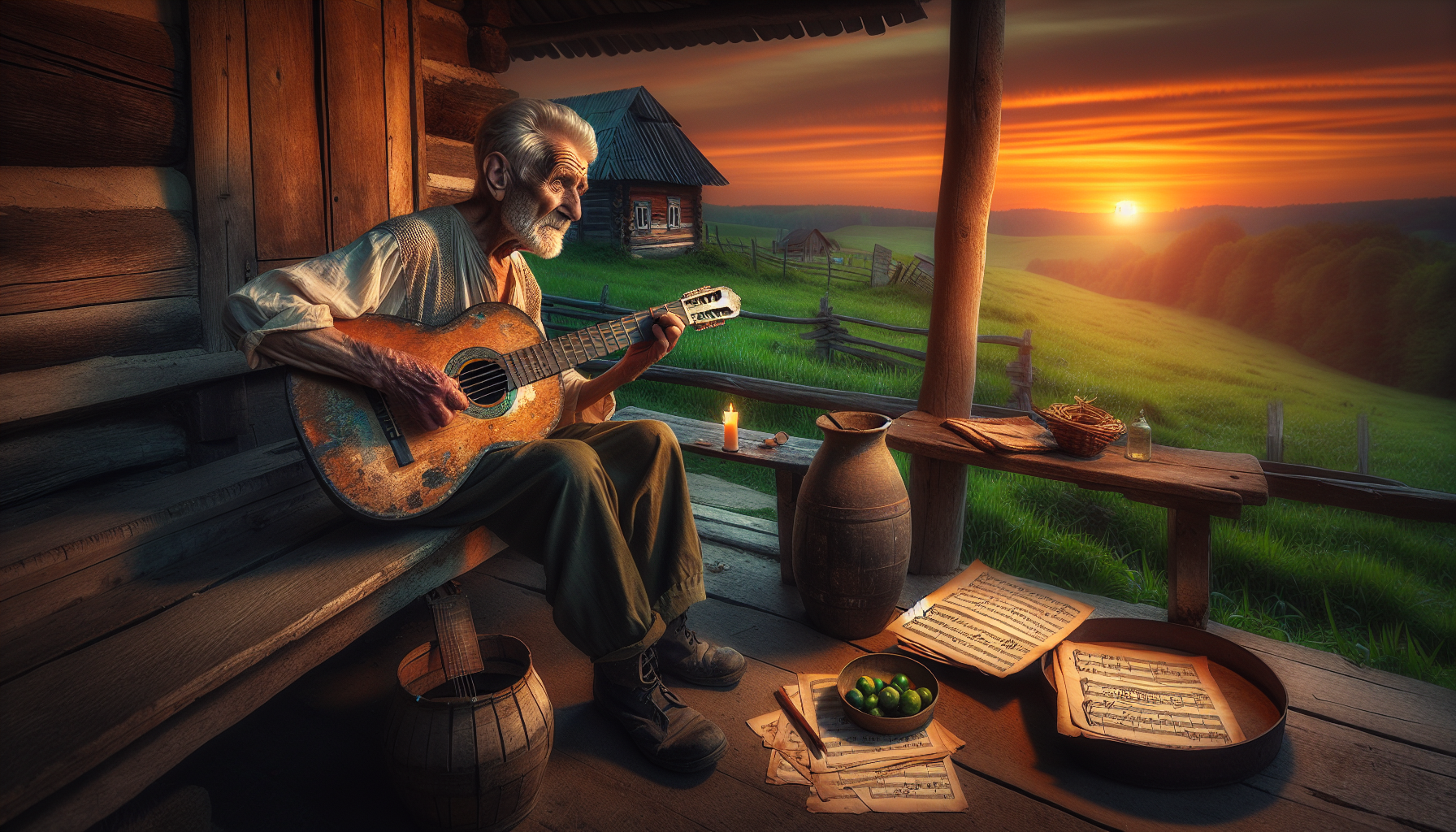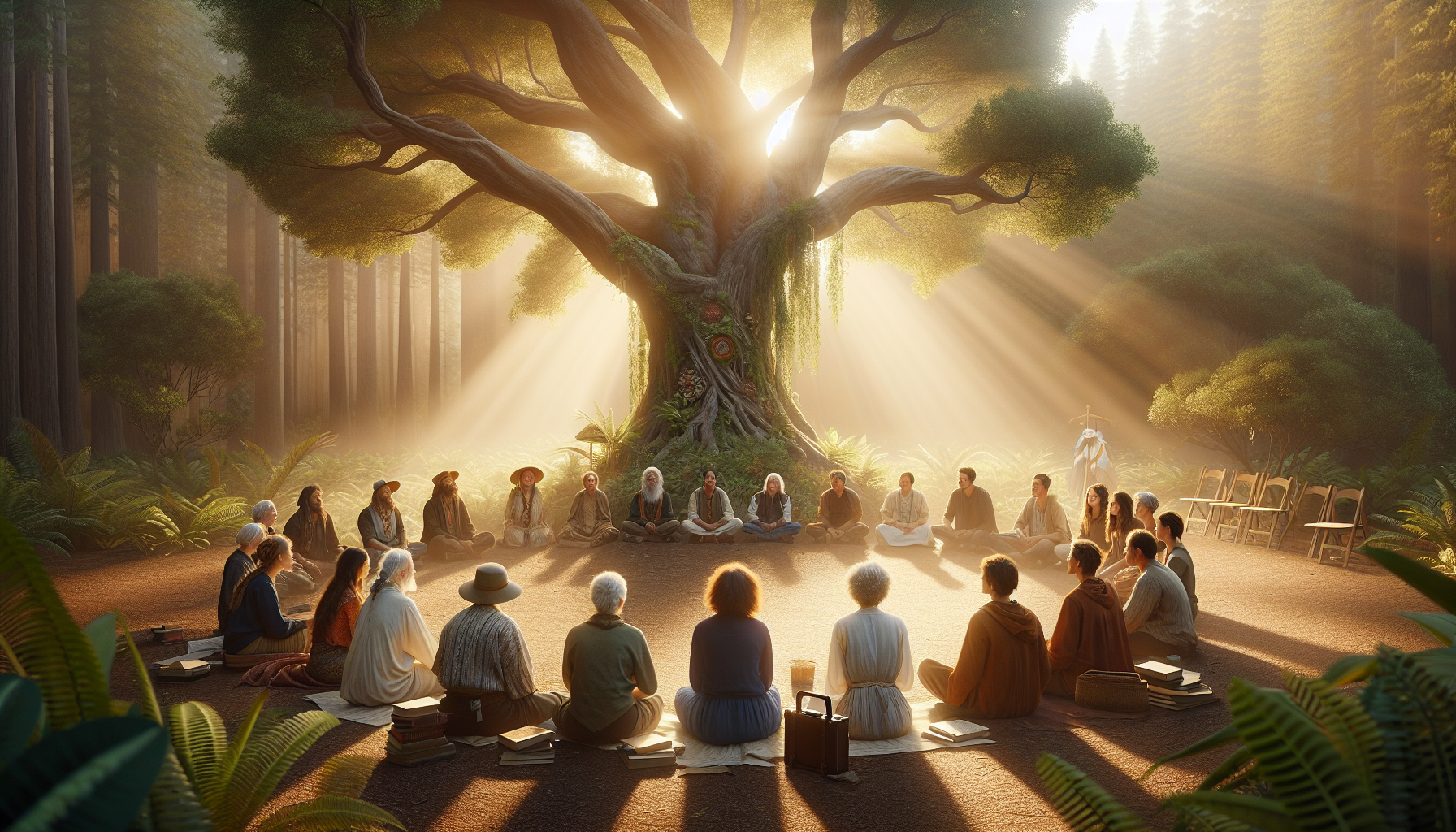In a world increasingly dominated by digital playlists and auto-tuned chart-toppers, there’s an undeniable allure in the raw, unpolished beauty of folk music. It’s a genre that transcends time, crossing generations with tales of love, loss, celebration, and resilience. Folk songs are the soul’s language, an expression of collective memories and cultural traditions passed down through the ages. These melodies, often simple yet profoundly moving, serve as powerful reminders of our shared humanity. But why is it that in today’s fast-paced, technology-driven society, we find ourselves yearning for these echoes of the past? What is it about folk song recordings that captivate us, urging us to reconnect with our roots and rediscover the heart of music? 🎶
This journey into the realm of folk music is not just about listening to songs; it’s about experiencing the rich tapestry of human history and emotion they weave. Folk songs have an unparalleled ability to tell stories, offering glimpses into the lives of those who came before us. From the Scottish Highlands to the Appalachian Mountains, these recordings capture the essence of their communities, serving as both a reflection and preservation of cultural identity. The stories told in these songs often revolve around universal themes—love, hardship, nature, and tradition—allowing us to connect across time and space. But beyond the narratives themselves, the authenticity in these recordings is what truly enchants us. Unlike the polished perfection of modern music, folk recordings embrace the rawness and imperfections that breathe life into the music, making it feel personal and real.
In this article, we will delve into the history and significance of folk song recordings, exploring their origins and evolution over the centuries. We will examine how these recordings have captured the essence of cultural traditions, acting as vessels of historical and social context. Moreover, we’ll discuss the resurgence of interest in folk music in contemporary society, as people seek genuine connections and experiences in an increasingly digital world. This renewed appreciation has led to a revival of traditional folk music festivals and a surge in artists who are dedicated to preserving these age-old songs while infusing them with modern elements. Through this exploration, we aim to understand why these timeless melodies continue to resonate with us, even in today’s rapidly changing musical landscape.
As we embark on this exploration of folk music, we invite you to rediscover the soul of music—one that is deeply rooted in tradition, storytelling, and authenticity. Whether you are a lifelong folk music enthusiast or new to the genre, there is much to learn and appreciate about these recordings that capture the heart and tradition of communities around the world. So, sit back, let the melodies transport you, and allow yourself to be immersed in the timeless beauty of folk music. It’s a journey of rediscovery, one that promises to touch the heart and stir the soul. 🌍
Understanding the Depth of Folk Music
Folk music, with its deep roots and rich cultural history, is an essential component of the world’s musical tapestry. The traditional songs that form the core of this genre have been passed down through generations, often reflecting the struggles, joys, and narratives of the common people. Folk music varies significantly across regions and cultures, yet shares the universal essence of storytelling, emotional expression, and community bonding. These recordings are more than just songs; they are historical artifacts that encapsulate the soul of communities.
The heart of folk music lies in its authenticity and simplicity. Unlike the polished, commercially-driven tracks of mainstream music, folk songs are often raw and unrefined, capturing the genuine emotions of their creators. This authenticity resonates with listeners, allowing them to connect with the music on a deeper, more personal level. In a world where technology and commercial interests often dominate, folk music serves as a reminder of our roots and the importance of preserving cultural heritage.
Folk songs are also educational, offering listeners insights into the cultural and social contexts of the time and place they originated from. For example, many folk songs recount historical events, societal changes, or local legends, providing a valuable historical record. This educational aspect makes folk music a crucial resource for historians, musicians, and cultural enthusiasts alike, offering a window into the lives and minds of past generations.
The Evolution and Influence of Folk Music
Over time, folk music has evolved, adapting to changes in society and technology while retaining its core essence. The advent of recording technology in the early 20th century played a significant role in this evolution, allowing for the preservation and dissemination of folk music on a scale previously unimaginable. Early recordings captured the voices and sounds of musicians who might otherwise have remained unknown, preserving their work for future generations.
These recordings have had a profound influence on other musical genres. Many contemporary artists draw inspiration from folk music, incorporating its themes and sounds into their work. This cross-pollination of genres has led to the emergence of new musical styles, such as folk-rock and indie-folk, which blend the traditional with the modern. By integrating elements of folk music, artists can add depth and authenticity to their work, appealing to a broader audience.
To further illustrate the impact of folk music, consider the following table comparing traditional folk elements with their influence on modern music:
| Traditional Folk Elements | Influence on Modern Music |
|---|---|
| Narrative storytelling | Inspires lyrical depth in genres like country and indie |
| Acoustic instrumentation | Influences the use of acoustic sounds in pop and rock |
| Community-driven performances | Encourages live music experiences and festivals |
Recording Folk Music: Capturing Tradition
The process of recording folk music is an art in itself, requiring sensitivity to the cultural and personal significance of the songs. Recording artists must strike a balance between preserving the original sound and adapting it for modern audiences. This often involves choosing the right recording environment, instruments, and technology to ensure the authenticity of the music is not lost.
Field recordings are a vital method used to capture folk music. These recordings are typically made in natural settings, where the music is performed in its original context. This approach captures not only the music but also the ambient sounds and atmosphere of the location, providing a more immersive experience for the listener. Field recordings play a crucial role in preserving the cultural significance of folk songs and ensuring that future generations can experience them as they were originally intended.
For those interested in the technical aspects of recording folk music, the following video provides a fascinating insight into the process: Recording Folk Music in the Field – Channel Name. Watch to gain a deeper understanding of the challenges and rewards of capturing these timeless songs. 🎧
The Role of Folk Music in Cultural Preservation
Folk music plays a crucial role in cultural preservation, acting as a repository for the traditions, beliefs, and values of a community. In many cultures, folk songs are used to pass down knowledge, teach moral lessons, and maintain historical records. They serve as a cultural anchor, providing a sense of identity and continuity in an ever-changing world.
In addition to preserving cultural heritage, folk music fosters a sense of community and belonging. Participatory music-making is a hallmark of folk traditions, bringing people together to share in the joy and catharsis of music. This communal aspect is vital for maintaining cultural ties and fostering intergenerational connections, allowing traditions to be handed down and adapted over time.
As globalization continues to influence cultural landscapes, the preservation of folk music becomes increasingly important. Efforts to document and share folk songs through recordings, publications, and performances help to ensure that these traditions endure. Organizations and initiatives dedicated to preserving folk music play a vital role in this process, working to keep the music alive and relevant for future generations.
- Support local musicians and folk music initiatives in your community.
- Attend folk music festivals and concerts to experience the music firsthand.
- Explore online resources and archives to discover traditional folk recordings.

Conclusion
**Conclusion: Rediscover the Soul of Music: Folk Song Recordings that Capture the Heart and Tradition**
In reflecting upon the rich tapestry of folk music, we have journeyed through a landscape where melodies are more than mere notes—they are the echoes of history, tradition, and the human spirit. Our exploration into the world of folk song recordings has unearthed the profound impact these sounds have on cultural preservation and identity.
Throughout this article, we delved into the origins of folk music, recognizing its roots as a communal and oral tradition that transcends generations. This music, born from the lived experiences and stories of everyday people, serves as a powerful reminder of our shared humanity and diverse cultural heritage. Folk songs are not just relics of the past but are living, breathing entities that evolve and adapt, reflecting the societal changes over time.
We also examined the role of modern technology and dedicated ethnomusicologists in preserving these invaluable recordings. The advent of audio recording in the late 19th and early 20th centuries marked a pivotal moment for folk music, allowing us to capture and archive these sounds for future generations. Today, digital platforms have further democratized access to folk music, enabling a global audience to discover and appreciate these cultural treasures. By highlighting projects such as the Smithsonian Folkways Recordings and the Alan Lomax Archive, we underscore the importance of continued support and engagement with these initiatives to safeguard our musical heritage. 🌍
Furthermore, our discussion highlighted the role of folk music as a catalyst for social change. Many folk songs have served as anthems for movements, giving voice to the marginalized and fostering solidarity among communities. These songs have the unique ability to resonate on a deeply emotional level, stirring listeners to reflect and act upon the issues of their time.
The significance of folk music extends beyond mere entertainment; it is a vital tool for education and cultural exchange. By engaging with these recordings, we open a window into different worldviews, fostering empathy and understanding across cultural divides. Folk music encourages us to celebrate diversity while recognizing the universal themes that unite us all.
As we conclude our exploration, it is crucial to recognize the timeless relevance of folk music in today’s fast-paced, digital world. In a time where we are constantly bombarded by fleeting trends, folk music invites us to slow down and reconnect with our roots. It reminds us of the power of storytelling and the profound impact of community and shared experiences.
We encourage you, dear reader, to delve deeper into the world of folk music. Seek out recordings, attend local folk festivals, and support artists who continue to keep these traditions alive. Share your discoveries with friends and family, sparking conversations about the cultural heritage that shapes us. By doing so, you become an active participant in the preservation and celebration of this rich musical legacy. 🎶
Moreover, we invite you to reflect on the role of music in your own life. How do the songs you listen to shape your identity and worldview? How can you contribute to the preservation and appreciation of cultural traditions, both within your community and beyond?
In sharing this journey with you, our hope is to inspire a renewed appreciation for the soul-stirring power of folk music. Let us continue to champion the stories and voices encapsulated in these recordings, ensuring they are heard and cherished by generations to come. Together, we can celebrate the enduring spirit of folk music and its ability to capture the heart and tradition of our shared human experience.
Thank you for embarking on this journey with us. We look forward to hearing your thoughts and reflections. Feel free to leave a comment below, share this article with others, or apply what you’ve learned in your own musical explorations. Together, let us keep the vibrant spirit of folk music alive and thriving for future generations. 🎵
*[Smithsonian Folkways Recordings](https://folkways.si.edu/)*
*[Alan Lomax Archive](https://www.culturalequity.org/alan-lomax-archive)*
Toni Santos is a visual storyteller and educational ethnographer whose work celebrates the fluid knowledge systems of nomadic cultures. Through art and research, Toni brings attention to how learning has thrived outside traditional institutions—rooted in movement, oral tradition, and deep connection to land and community.
Guided by a passion for ancestral wisdom, adaptive pedagogy, and cultural resilience, Toni explores the tools, rituals, and environments that once shaped the minds of travelers, herders, and migrating communities. Whether illustrating storytelling circles beneath open skies, wearable mnemonic devices, or maps woven into textiles, Toni’s work honors learning as a lived, sensory, and communal experience.
With a background in visual anthropology and intercultural design, Toni reconstructs the educational models of mobile societies through images and narratives that restore their dignity and relevance in today’s world.
As the creative mind behind Vizovex, Toni shares a rich tapestry of visual essays, artifact-inspired art, and curated stories that reveal the genius of teaching and learning on the move.
His work is a tribute to:
The wisdom of learning through journey, rhythm, and story
The spatial and environmental intelligence of nomadic cultures
The power of intergenerational knowledge passed outside walls
Whether you’re an educator, researcher, or lifelong learner, Toni invites you to step into a world where education is not confined, but carried—one step, one song, one shared insight at a time.




